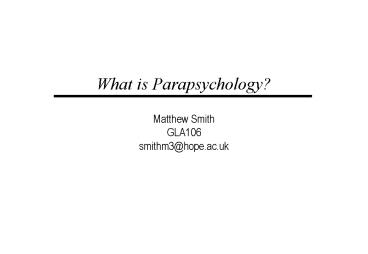What is Parapsychology - PowerPoint PPT Presentation
1 / 19
Title:
What is Parapsychology
Description:
also, experiences suggestive of postmortem survival of personality ... ESP, PK, or postmortem survival? telepathy. apparitions. Out-of-Body Experiences ... – PowerPoint PPT presentation
Number of Views:620
Avg rating:3.0/5.0
Title: What is Parapsychology
1
What is Parapsychology?
- Matthew Smith
- GLA106
- smithm3_at_hope.ac.uk
2
Session aims
- to identify boundaries and methods of
parapsychology - Psychic experiences
- Terms and definitions
- Range of paranormal phenomena
- to give outline of module
- Topics covered
- Assessment
- Learning resources
3
Beliefs in paranormal phenomena
- rate your agreement to the following statements
on a scale of 1 to 5 - 1 2 3 4 5
- strongly somewhat
uncertain somewhat strongly - diagree disagree
agree agree - It is possible to see into the future using
psychic powers - Some people are able to read other peoples
minds using telepathy - A persons thoughts can directly influence the
movement of a physical object - Your mind or soul can leave your body and travel
- There is such a thing as life after death
4
psychic experiences
- variety of so-called paranormal or psychic
experiences - premonitions
- telepathic communication
- seeing ghosts
- out-of-body experiences
- bizarre coincidences
- in general, psychic experiences have 2
characteristics - correspondence between subjective feeling and an
external event - absence of any known mechanism which may explain
the correspondence
5
Classifying psychic experiencesterms and
definitions
Most experiences can be classified as...
- Extrasensory perception (ESP)
- telepathy (awareness of another persons
experience) - clairvoyance (awareness of an object/event)
- precognition (awareness of future event)
- Psychokinesis (PK)
- influence of mind on physical events
- also, experiences suggestive of postmortem
survival of personality
6
Classifying psychic experiencesterms and
definitions
Most experiences can be classified as...
- Extrasensory perception (ESP)
- telepathy (awareness of another persons
experience) - clairvoyance (awareness of an object/event)
- precognition (awareness of future event)
- Psychokinesis (PK)
- influence of mind on physical events
- also, experiences suggestive of postmortem
survival of personality
Psi (Y)
7
Classifying experiencesthe range of paranormal
phenomena
How might the following phenomena be best
classified... ESP, PK, or postmortem survival?
premonitions xenoglossy Near-Death
Experiences interfering with machine
activity (e.g., computers) reincarnation
experiences possession metal bending
poltergeist activity thoughtography levitation oui
ja mediumship psychic healing dowsing (water
divining) materialization dematerialization
telepathy apparitions Out-of-Body
Experiences influencing random processes (e.g.,
roulette wheel) automatic writing clairvoyance hau
ntings
8
Classifying experiencesthe range of paranormal
phenomena
postmortem survival?
ESP?
PK?
influencing random processes (e.g., roulette
wheel) interfering with machine activity (e.g.,
computers) poltergeist activity thoughtography lev
itation metal bending psychic healing materializat
ion dematerialization
apparitions hauntings Near-Death
Experiences Out-of-Body Experiences reincarnation
experiences mediumship possession
telepathy clairvoyance premonitions xenoglossy aut
omatic writing dowsing (water divining) ouija
9
Defining parapsychology
working definitions
branch of psychology concerned with paranormal
phenomena. (Reber, 1995, Dictionary of
Psychology)
the scientific study of psi phenomena. (Ra
din, 1997)
- the scientific field that is concerned with
interactions, both sensory and motor, that seem
not to be mediated by any recognised physical
mechanism or agency. - (Rush, 1986)
10
Parapsychology is not...
- Occultism
- occult hidden
- refers to hidden/esoteric knowledge
- Psychiatry
- some psychic experiences/beliefs may be
indicative of psychological disorder - schizophrenia hallucinations delusional beliefs
- parietal lobe disturbance experience a
presence - temporal lobe epilepsy hallucinations
apparitions - cerebral anoxia apparitions, features of NDE
...although maybe some overlap?
11
Approaches to studying the paranormal
- survey methods
- indicate level of experience and belief
- spontaneous cases
- investigate incidents as they happen
- single case studies
- testing strong psychic claims
- experimental approach
- assumes everybody has some psychic ability
- phenomenological approach
- focus on the experience itself
12
Model for assessing psi
PSYCHIC
TARGET
13
Model for assessing psi
PSYCHIC
TARGET
14
Model for assessing psi
PSYCHIC
TARGET
OBSERVER
15
Model for assessing psi
PSYCHIC
TARGET
OBSERVER
inference psi?
adapted from Morris (1986) in Edge, et al.
(1986). Foundations of Parapsychology.
16
Overview of course
- What is parapsychology?
- The psychology of paranormal belief and
experience - Bringing psi into the laboratory
- Spontaneous paranormal experiences
- The ganzfeld debate
- Mediums and Psychics
- Project guidance
17
Overview of course
- Psychophysiology and paranormal experience
- Rhetoric, debate and dialogue Constructing the
paranormal - Conjuring, deception and the skeptical
perspective - 11. Psi and spirituality
- 12. Bringing it all together Challenges for the
future of parapsychology
18
Assessment
- Project (75)
- 2250-2700 words
- Involves gathering data on an a topic
- Work in groups of 2-3 but individual reports (may
take different slants) - Submission Tuesday 25 April 2006
- One hour examination (25)
- One essay question from a choice of five
19
Learning resources
- Web page
- hopelive.hope.ac.uk/psychology/LevelH/para/index.h
tm - Libraries
- Sheppard Worlock Library
- University of Liverpool libraries
- Liverpool John Moores University
- Avril Robarts Learning Resource Centre































